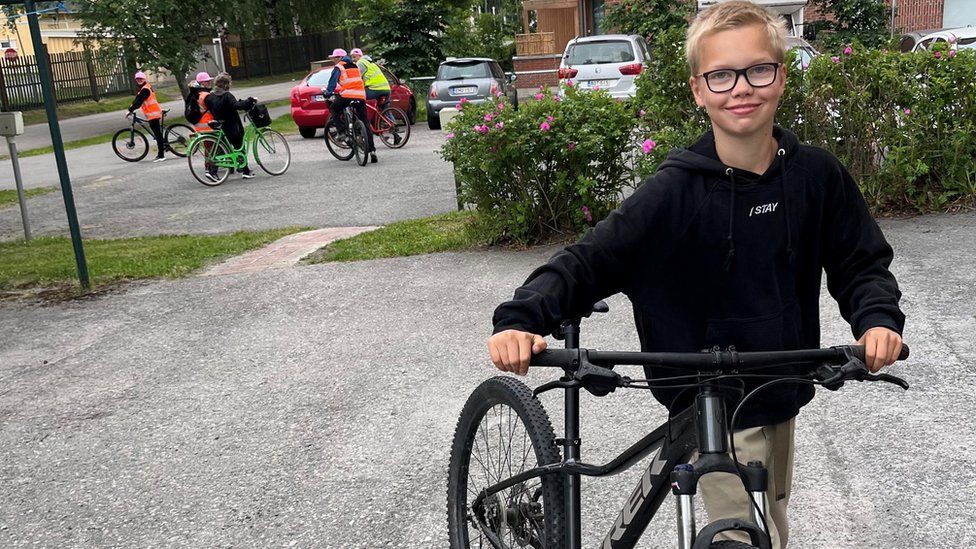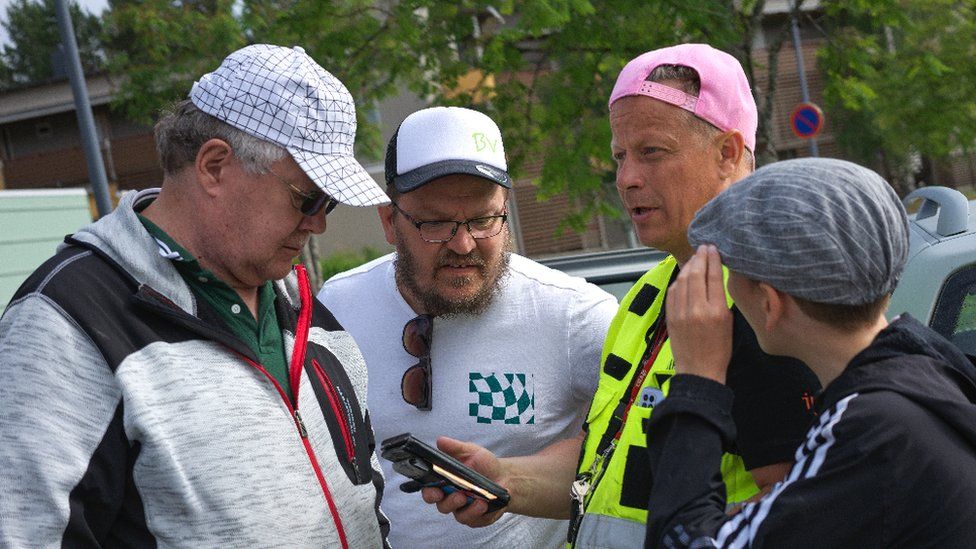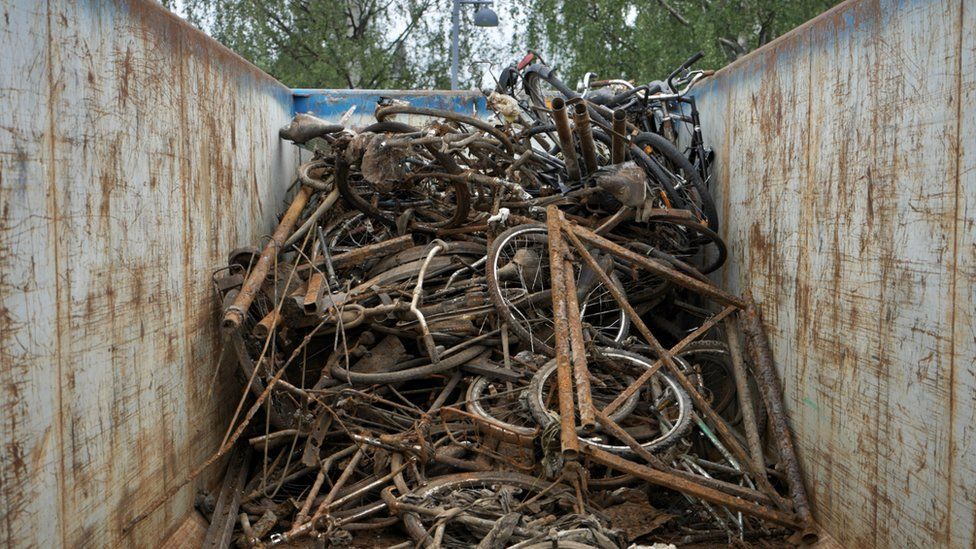Volunteers patrol the town of Oulu to try to recover stolen bicycles - many are being used by drug dealers
The man's name is Ilkka Pulkkinen. He's not a policeman but an ordinary citizen who leads a team called Bike Patrols - volunteers who spend several hours a day chasing stolen bikes in Oulu, a city 170km (100 miles) south of the Arctic Circle in Finland.
He found Valo's bike dumped in the forest. The chain has snapped but otherwise it is in good shape.
"It was almost brand new when it disappeared," says Valo's father.
"The chain is easy to fix, you'll be back in the saddle tomorrow."
He messaged Bike Patrols on Facebook when his son's bike went missing. "They promised to find the bike and they did," he says.
Bike theft is a big problem in this city of 200,000 people, known as Finland's cycling paradise. It boasts the country's most extensive bicycle network with over 1,000km (621 miles) of dedicated, well-maintained flat paths.
In summer, 77% of Oulu's residents use their bikes and 42% carry on cycling in the winter despite the snow and an average temperature of -8C.
The infrastructure is so good that young children cycle to school on their own.
But thieves have taken advantage of the large number of bicycles, with 1,738 cases of theft reported to police in the past year.
Bike Patrols has an exact figure: over the past year they have found 1,298 stolen bikes.
How did they do it?
"It all started last September when my friend's bike was stolen. I posted a photo of the bike to social media. People gave me tips in the comments and we found it very quickly. It was almost too easy," laughs Ilkka.
"And I told my friend: 'So many bikes are stolen in Oulu. Let's go and find more.'"
Ilkka set up his own Facebook page: Stolen Bikes, Oulu.
Requests for help started flooding in, along with offers of assistance from people from all walks of life.
Olivia Hamalainen, 19, volunteered to help after her best friend's bike was stolen from her school.
"Life is expensive here in Finland. When you're a student, you don't have a lot of income. A bike is how you get from A to B. So it's a big problem if it's stolen."
Ilkka oozes confidence as he explains how easy it is for him now to locate stolen bikes. "People told us where bikes disappeared from. We checked out each location and slowly figured out where stolen bikes ended up in different parts of the city."
Ilkka learnt that many bikes were hidden in storage areas inside or outside residential buildings. Housing associations are required to clear out such spaces once a year. "In one that we've just seen, there were 20 unclaimed bikes, probably all stolen," he says.
As in many other cities around the word, bike theft is fuelled by drug users, and in Oulu they often leave stolen bikes unlocked at a place agreed for handover with dealers, Ilkka says. Bike Patrols' volunteers check such handover locations several times a day.
If they get there before the bikes are picked up, the rightful owners will be reunited with their bikes within a very short time.
Being on the road so much also means that Bike Patrols are often at the right place at the right time.
In Kaakkuri, south of the city centre, Olivia and other volunteers spotted two 14-year-old boys trying to snap a cable lock on a bike.
"They just ran away. Ilkka called the police and gave them the serial number. The bike had been reported to them as stolen and we were asked to bring it to the police station. They will hand it over to the owner."
Ilkka says much of his success comes from using common sense - a point he illustrates after coming to an abrupt halt next to a shiny new electric bike outside a health centre.
"This is worth €5,000 (£4,300) and it has a cheap number combination lock and a rusty old chain. It doesn't look right," says Ilkka, before marching into the building to ask a guard to check footage from a security camera.
"It's one of the places in the city centre where we find eight to 10 stolen bikes every week."
His phone keeps ringing and he says he gets 50 to 60 messages a day. He's on his bike for up to five hours a day and may cycle more than 500km (330 miles) in a week.
"I just want to help people get their bikes back. The best thing is that people know we're here and we'll come before the police can come," Ilkka says proudly.
Police say they appreciate Bike Patrols' work, and co-operate with them.
"We're not jealous of them," says Detective Superintendent Janne Koskela. "They do a good job."
Over the summer Ilkka and his team explored the sea water that surrounds the western side of the town.
"We were curious and we started experimenting with magnets and hooks and in the end we managed to lift 300 bikes from the seabed."
But very few could be identified and most were taken to a scrap yard, he says.
Olivia Hamalainen hopes that Bike Patrols may become an inspiration for others.
In 2021, 47% of Finns said they had done some volunteering in the previous year - mostly helping the elderly and disabled or working with children's sports clubs.
But the kind of innovative volunteering work that Bike Patrols does is unique.
The team has responded to a real need and in less than a year it has evolved into a well-respected and successful local organisation.
"We've also created a community," says Olivia, "which is very important in Finland where many people say they don't have friends."




Ei kommentteja:
Lähetä kommentti